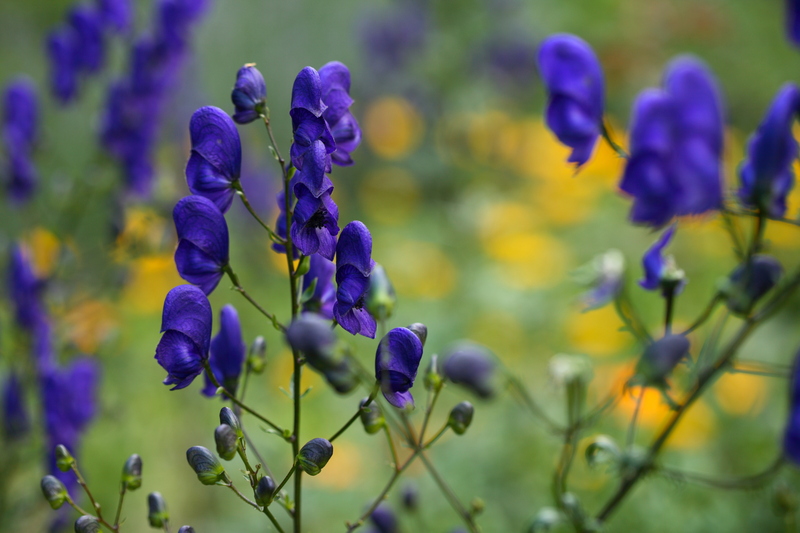Cultivating Healthy Soil from Organic Leftovers
Posted on 28/05/2025
Cultivating Healthy Soil from Organic Leftovers: The Ultimate Guide
Turning household organic leftovers into rich, living soil is a sustainable practice that benefits your garden and the environment. Whether you're a gardening enthusiast seeking to boost plant health or a beginner hoping to reduce kitchen waste, learning how to cultivate healthy soil from organic waste will transform your green space and reduce your ecological footprint. In this guide, we'll delve into the science of soil health, the process of composting, and actionable tips for making your soil thrive, all from common food scraps and yard trimmings.
The Importance of Healthy Soil
Soil isn't just "dirt." It's a complex, living ecosystem teeming with microbes, fungi, earthworms, and insects. Healthy soil is the foundation of robust gardens and agriculture. When nurtured with organic matter like kitchen scraps, it provides numerous benefits:
- Supports plant growth: Supplies vital nutrients and minerals
- Improves water retention: Reduces irrigation needs
- Promotes biodiversity: Encourages beneficial organisms
- Fights erosion: Creates stable, fertile ground
- Sequesters carbon: Mitigates climate change
By transforming organic waste into soil nutrients, gardeners close the loop in a truly sustainable system.

What Are Organic Leftovers?
Organic leftovers refer to biologically derived materials that would otherwise be considered waste. These include:
- Fruit and vegetable peels
- Coffee grounds and tea bags
- Eggshells
- Garden trimmings and grass clippings
- Shredded leaves and small branches
- Bread and grains (in moderation)
Avoid adding animal fats, meats, or dairy to your pile as they attract pests and can disrupt the decomposition process.
How Organic Matter Boosts Soil Health
When organic leftovers are added to soil, they break down and become humus--a dark, nutrient-rich substance vital to plant growth. Humus:
- Enhances soil structure, making it easier for roots to grow
- Promotes moisture retention while improving aeration
- Encourages microbial life, which breaks down nutrients further
- Acts as a slow-release fertilizer, supplying essential elements over time
- Buffers against pH fluctuations and heavy metals
In short, combining composted kitchen scraps with native soil creates a thriving environment for healthy plant development.
The Basics of Composting: Creating Black Gold From Waste
Composting is the controlled decomposition of organic plant and food waste into soil conditioner. It's the primary method for cultivating healthy soil from organic leftovers at home.
Understanding the Composting Process
The magic of composting comes from a delicate balance between carbon-rich materials ("browns") and nitrogen-rich materials ("greens"):
- Browns: Dried leaves, cardboard, paper, sawdust
- Greens: Kitchen scraps, grass clippings, fresh garden waste
Aim for a roughly 3:1 ratio of browns to greens. This balance optimizes microbial activity and heat, turning waste into compost efficiently.
Step-by-Step Composting Guide
- Choose a Location: Select a well-drained spot for your compost pile or bin.
- Layer Materials: Start with a base of coarse material (twigs, straw), then alternate layers of browns and greens.
- Add Water: Moisten each layer as you build. The pile should feel like a wrung-out sponge.
- Turn Regularly: Every few weeks, mix the pile to aerate and speed up decomposition.
- Check Temperature: Active piles may heat up. When cooling, it's time to turn again.
- Wait and Apply: Compost is ready when dark, crumbly, and earthy-smelling. Mix it into your garden beds.
Vermicomposting: Turning Kitchen Scraps into Worm Castings
If space is limited or you want rapid results, vermicomposting (worm composting) is a fantastic way to utilize kitchen scraps for soil improvement. Red wiggler worms consume organic leftovers, producing nutrient-rich worm castings--one of the most potent natural fertilizers.
Setting Up a Worm Composting Bin
- Get a bin: Choose a plastic or wooden container with drainage holes.
- Add bedding: Shredded newspaper moistened with water works well.
- Add worms: Red wigglers are ideal for home composting.
- Feed leftover scraps: Small amounts of fruit, veggies, and coffee grounds.
- Harvest castings: Once the bedding turns black and crumbly, separate worms and use castings as soil enrichment.
Types of Organic Leftovers for Best Results
While most biodegradable kitchen and yard waste can benefit your compost, some items are particularly potent in supplying nutrients:
- Banana peels: High in potassium, vital for flowering plants.
- Coffee grounds: Provide nitrogen and improve soil structure.
- Eggshells: Supply calcium to prevent blossom-end rot in tomatoes.
- Tea leaves: Add trace minerals and aid decomposition.
- Vegetable scraps: Break down into general-purpose plant food.
Maximize the benefits by chopping large pieces and mixing different leftovers for a diverse nutrient profile.
Best Practices for Cultivating Healthy Soil from Organic Waste
1. Shred or Chop Your Leftovers
Smaller pieces break down faster. Chop up fruit and vegetable scraps to speed up the composting process and prevent matting, which can reduce aeration.
2. Balance Moisture Levels
Compost that's too wet turns slimy and smelly, while dry piles halt microbial activity. Regularly check for a moist--but not soggy--consistency.
3. Avoid Compost Contaminants
- Remove produce stickers and non-organic wrappings
- Avoid oily foods, meat, and dairy
- Keep weeds with mature seeds out of the compost to prevent spreading
4. Incorporate Finished Compost into Your Soil
Once your compost is ready, dig it into garden beds 2-4 weeks before planting to allow organic matter to integrate and nourish the soil.
The Role of Microorganisms in Soil Health
When you add organic waste to your soil, you're not just boosting nutrients; you're supercharging the microscopic ecosystem. Beneficial microbes:
- Break down complex materials into plant-available forms
- Suppress soil-borne diseases
- Improve nutrient cycling and retention
- Support plant immunity and stress resistance
For an even greater boost, inoculate your compost with a handful of healthy garden soil or finished compost, introducing a wider array of beneficial organisms.
Mulching with Organic Leftovers
Did you know you don't have to compost all your organic waste? Direct mulching is another effective method. Spread shredded leaves, grass clippings, or chopped food scraps on your soil surface to:
- Suppress weed growth
- Protect soil from temperature extremes
- Conserve moisture by reducing evaporation
- Slowly feed soil as materials decompose in place
*Always cover food scraps with a layer of leaves or grass to deter pests and maintain aesthetics.
Soil Amendments from Specific Organic Leftovers
Coffee Grounds
Coffee grounds are excellent for improving soil texture and supplying nitrogen. Use them lightly, mixing with other materials to prevent clumping and acid buildup.
Eggshells
Crushed eggshells are a slow-release calcium source--sprinkle around tomato plants to prevent blossom-end rot.
Banana Peels
Chop up banana peels and bury them under a few inches of soil to provide potassium, phosphorus, and magnesium directly to roots.
Wood Ash (With Caution)
In small amounts, wood ash from clean, untreated sources adds potassium and raises pH--ideal for acidic soils. Use sparingly and never combine with nitrogen-rich materials, as it can cause ammonia loss.
Common Problems and How to Solve Them
Foul Odors
- Usually caused by too much moisture or lack of airflow. Add more browns and turn the pile.
Pests or Rodents
- Avoid animal products and always cover food scraps. Use a closed bin if necessary.
Slow Decomposition
- Increase surface area by shredding, maintain the right moisture balance, and monitor your brown/green ratio.
Benefits Beyond the Garden: Why Cultivating Healthy Soil from Organic Leftovers Matters
By recycling organic leftovers into healthy soil, gardeners and homeowners can dramatically reduce landfill waste, lower greenhouse gas emissions, save money on fertilizers, and help restore natural cycles.
- Immediate cost savings: Home composting reduces the need for synthetic fertilizers and soil amendments.
- Environmental stewardship: Diverting organic waste from trash streams means less methane gas in landfills.
- Soil resilience: Amended soils resist drought, pests, and diseases better, aiding food security and ecosystem health.

Frequently Asked Questions About Cultivating Healthy Soil from Food Scraps
Can I use all kitchen leftovers in my compost?
Not all. Stick to plant-based scraps; avoid meat, bones, dairy, and oils to prevent pests and odors.
How long does it take to turn organic waste into usable compost?
With proper maintenance, most backyard piles take 2-6 months to fully mature, while vermicomposting can be faster.
Is it possible to cultivate healthy soil indoors?
Yes! Try vermicomposting bins or small-scale compost tumblers for indoor composting.
Conclusion: Transforming Organic Leftovers into Soil Gold
_Cultivating healthy soil from organic leftovers isn't just a gardening trend--it's a transformative habit with benefits for your plants, pocketbook, and the planet._ By harnessing composting, vermicomposting, and direct mulching techniques, you can convert food and yard waste into a self-renewing soil resource. With every banana peel or coffee ground returned to the earth, you're building soil health, reducing waste, and nurturing a sustainable future. Start today and watch your garden--and local ecosystem--thrive.
Latest Posts
Chic Hedge Designs: Trimming Techniques to Impress
Frost Foes: Strategies to Shield Your Garden from Winter's Grip
Nature's Blueprint: Using Gardens to Combat Climate Change

